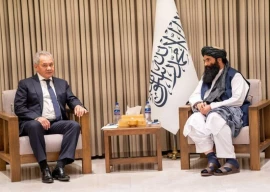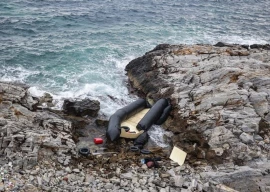
The primary bone of contention, leading to the opposition boycotting the elections, was the 2011 amendment to the Constitution which, among other things, abolished the caretaker government set-up mandated before every general election. The opposition claimed that Sheikh Hasina’s party, the Awami League (AL), will use its incumbent status to win the elections, whereas the AL termed the caretaker government unnecessary. Interestingly, both times the AL has come to power, it had been after a caretaker government had held free and fair elections.
Democratic transitions are never easy and are, at times, more crucial for the country than the completion of term for the incumbent government. It is in the ‘handing over’ of power that the real strength of democracy — and indeed the country — can be measured. Like Pakistan, Bangladesh has had a chequered past relationship with democracy. The importance and role of religious parties (especially after the recent spate of violence) can also not be underestimated. Therefore, a non-partisan caretaker set-up was introduced in the mid-1990s which had since then carried out a fairly successful transition every time (including when the military interfered a few years ago). So why scrap it now? While I am not privy to all quarters, it is clear that the AL was worried that it might lose the general election and therefore wanted to continue governing till the last moment so that it could influence the elections. Arguing that it had the democratic mandate to rule till the last date and had more legitimacy than the unelected caretaker government, the AL wanted to change its slated bad performance at the polls. However, this step has brought Bangladesh to a dangerous crossroads once again.
Bangladesh, in 2014, is going to be a very unstable country. With a government which does not have much legitimacy, a war crimes tribunal which has elicited critical international comment, and an existential and real battle between the forces of secularism and religion, 2014 might be the year of the fight for Bangladesh’s soul. More so as compared with Pakistan where there are no secular parties, Bangladesh has a clearly pro-secular AL and a pro-religion BNP and so there is, in effect, a clear ideological choice for the people. Carrying on like this will not only weaken the AL, but also weaken the cause of a secular Bangladesh where people from all communities might live in peace and with equal rights — a provision which was only partially restored in the Bangladesh Constitution in 2011.
What also remains to be seen is the attitude of the military. While it might not want to directly interfere as in 2007, continued unrest (there have already been over 90 days of strikes) and killings (over 20 were killed on election day alone) and its adverse effect on the economy and the simple administration of the country, might force its hand.
Pakistan and Bangladesh have developed in different ways since they separated, but Pakistan’s successful experience with the 2013 caretaker government, which was accepted by all sides, should show our Bengali brethren that scrapping the provision was a bad idea. Sheikh Hasina should not look for just the short-term political gain this sham election victory can bring, but save the soul of the country her father gave his life for.
Published in The Express Tribune, January 14th, 2014.
Like Opinion & Editorial on Facebook, follow @ETOpEd on Twitter to receive all updates on all our daily pieces.
COMMENTS (16)
Comments are moderated and generally will be posted if they are on-topic and not abusive.
For more information, please see our Comments FAQ

















@Pleb:
"Bangladesh vs Pakistan: $1 = 78 Bangladeshi Taka $1 = 105 Pakistani Rupee Bangladesh Bank foreign exchange reserve: $18 billion State Bank of Pakistan foreign exchange reserve: $3.4 billion Says it all!"
Good facts. The reason for this disparity is that BD is not committing a lion's share of its resources on the military to counter an eternal enemy. As a result, BD will continue to outpace Pakistan economically, socially and in education.
India considers Bangladesh to be part of its ancient land, its called Anga. Even though India considers Pakistani territory to be part of its ancient lands(Indus), the scythians and central Asians who live on, occupy and overwhelmingly influence the Indus is forever lost.Hence, frankly,I think, India is helping Bangladesh move over Islamic fundamentalism and hence puppet governments will continue to follow.Once that is done, the systems are in place.Its just a matter of time, before it is annexed or unified with the motherland. But in the case of Pakistan, its gone too far.There will only be a walling out, that is unless Pakistanis by own will defeat the fundamentalism, central Asians go back to Azerbaijan or wherever, Scythians move back to the Hindu Kush and sub Iranian territories and let the Mohajirs run the country, then, there might be final closure.Its possible and its a good ending for everyone. The stakeholders in the subcontinent must talk about this for lasting peace, but Iran has already walled out the place and one doesnt think Afghanistan, Tajikistan or Uzbekistan will take the scyths back.
Very few countries have this concept of a care taker Government conducting Elections. Those countries are not well disposed to Democracy as extra Constitutional forces could destabilize them. The battle for the Soul of Bangladesh is proving to be a bitter one. Hasina better watch out because money will be coming in bucket full from the primitive Gulf Kingdoms, averse to any Islamic country being secular. Now that those forces have finished their job of ruining Pakistan and Afghanistan they are free to target Bangladesh. The Bhadralok better watch out.
@Assad: Isn't this the whole point? BD is getting preferential treatment. Why? BD has no disruptive war going on. Why not?
Forex reserves or stable currencies are the results of what you are doing. It is not the other way around.
And, "the Indian instigators here spare no opportunity" - please don't take credit away from the Bangladeshis and give it to the Indians.
You guys keep wanting to feel close to BD even when they don't want - almost like uninvited guests. Bangladesh got its independence 42 years back. The 1965 war was just 18 years after India and Pakistan split. See the difference?
In my opinion it serves Khaleda Zia to boycott and create instability with Islamist parties. If she were a person concerned with Bangladeshis then she would have participated in the election and taken the defeat in her stride. It will be Khaleda Zia and her cohorts who are to be blamed if Bangladesh becomes unstable.
@Pleb: Please refrain from idiotic comparisons. This is a cyclical thing. BD got preferential treatment on their exports thus the forex reserves are more stable. Pakistan's GDP is still significantly larger than BDs. Secondly, BD does not have a disruptive war going on in its neighbourhood and neither is there an insurgency being fought in BD. On account of the war in Afghanistan and the resulting insurgency in FATA, Pakistan has already lost close to $70B in terms of trade etc. There is no FDI coming in, which helps increase the Forex, and the cost of doing business with Pakistan is also higher nowadays.
I know folks from BD get really touchy, but learn to accept a different PoV. You guys lecture us about how bad things are in Pakistan, perhaps you should take a break from dishing and learn to receive some from us as well. Secondly, the Indian instigators here spare no opportunity to sow more discord between BDs and Pakistanis.
The article is a constructive one from a Pakistani. No need to get all bent out of shape.
What has happened possibly may be good for Bangladesh ( its too early to say definately ) but for democracy in its true sense, its a complete disaster.
@Author: The primary bone of contention, leading to the opposition boycotting the elections, was the 2011 amendment to the Constitution which, among other things, abolished the caretaker government set-up mandated before every general election.
This caretaker setup is a curious affair. I admit I first heard of it during the Pakistan elections. I have checked and it seems to be a practice only in a handful of countries. Democracy envisages a seamless transition of power from one administration to another. A caretaker setup in unnecessary if people have enough faith in the body that carries out the elections as in India, US, EU countries, etc.
Bangladesh vs Pakistan:
$1 = 78 Bangladeshi Taka $1 = 105 Pakistani Rupee
Bangladesh Bank foreign exchange reserve: $18 billion State Bank of Pakistan foreign exchange reserve: $3.4 billion
Says it all!
The BNP boycotted because they knew they would not win. They tried to sabotage democracy in Bangladesh.
" but also weaken the cause of a secular Bangladesh where people from all communities might live in peace and with equal rights" Clearly you haven't seen how Islamic political parties are treated in Bangladesh, they don't have rights.
Let's have a different perspective. BNP and others have learned that throwing tantrums in a democracy won't work. I hope AL rules full-term. In that case, no other party will ever boycott elections.